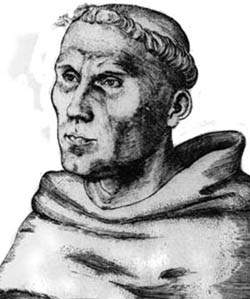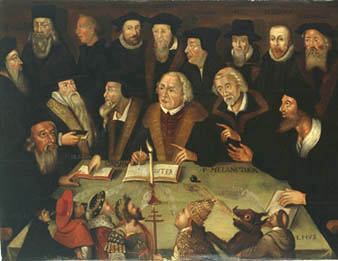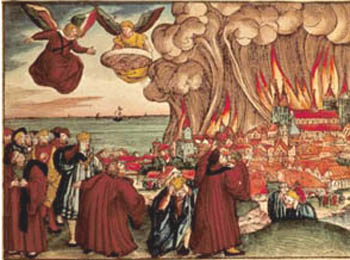 |
Faith under Attack
Luther’s Lack of Credibility
Fr. Leonel Franca, S.J.
Luther began by denying. He denied authority; he denied tradition; he denied the Church Magisterium; he denied the organic, visible and hierarchical Church. What gave him the right to do so? What were his titles that authorized him to perform such a task? Hadn’t Christianity already existed for 15 centuries? Hadn’t the priests, Bishops and Popes come down to us in uninterrupted succession from the Apostles and Christ Himself?

Luther's revolt began with denial |
According to Luther, the Church had lost her early spirit, adulterated the teachings of the Gospel, laden herself with a mass of superstitions, and prostituted herself with the idolatry of Babylon.
How did he know this? Where was his proof? Hadn’t Christ promised His infallible assistance to the Church? Hadn’t He assured her that He would be with her always until the end of time?
But Luther did not care about answering these questions. He entrenched himself behind the Bible. Scripture should shield him from all adversaries. But who interprets the Bible?
Wasn’t it interpreted in the past by the Catholic Church, as it continues to be until today? Wasn’t Scripture read by all the Church Fathers and Doctors? Wasn’t it known by the Councils? Wasn’t it preached and spread by all the authentic Saints who reformed the Church? Why had it never occurred to them to start a reform by destroying the Church in the name of Scripture, of using the Bible as a banner of revolt against the authority established by Christ?
It was Luther alone who discovered the special secret of exegesis, unknown to all the Church Fathers until then. He, the brazen friar, established himself at the prophetic heights as a new evangelist who received enlightenment straight from the Holy Ghost and entered into communion with the inner life of the Trinity. (1) From this inaccessible pinnacle he claimed to bring the world the gift of a sacred hermeneutics that would establish a whole new Christianity.
Thus, taking one step after another, Friar Martin Luther felt himself obliged to assume a divine mission, to assign to himself a special religious undertaking.
What were his credentials for this extraordinary embassy? Without hard, solid proof, no one can rise up from the multitude and affirm that he is a special envoy of the Almighty. Without first indisputably demonstrating the authenticity of his plenipotentiary mission, no man can pretend to know the divine oracles and dictate a religion for mankind. God alone can impose religion upon man.
To teach religious truths that should be believed and precepts that should be practiced without divine credentials is a fraud, an imposture, a deception. Our dignity as rational beings rebels against such exploiters of the public naïveté. O Prophet of Wittenberg, where are the credentials for your divine mission?
No miracles as a sign of his divine mission
The guarantee we have of the divine origin of a doctrine relies on its proponent’s authority received from on high. God attests to the authority of His envoys by means of miracles. Such physical miracles reflect the divine envoy’s irreprehensible sanctity, which is also a moral miracle. Only miracles, extraordinary interventions of divine omnipotence, can authenticate missions from heaven.

Not one single miracle could be claimed by Luther or the circle of pseudo-reformers |
With miracles Jesus proved He was the Messiah (2); with miracles God confirmed the mission of the Apostles (3). Through miracles Christian apologetics, based on reason and the teachings of the inspired Books, recognized the inimitable signature of the Divine Author in His extraordinary manifestations to mankind.
Luther himself recognized the need for this heavenly authentication. In 1524, trying to prevent Thomas Münzer (another Protestant who took the side of the Anabaptists) from preaching in Mulhouse, he wrote to the city magistrates and insisted they should not receive this turbulent innovator unless he could not prove his mission with extraordinary works: “If he says that God and His Spirit are sending him as they did the Apostles, let him prove it with prodigies and miracles; if not, forbid him to preach.” (4)
When another German Protestant, Andreas Karlstadt, contradicted him, appealing to divine enlightenment, Luther challenged him to demonstrate his vocation with miracles: “God must show that He revokes His ancient precepts with miraculous works.” (5) On another occasion he affirmed: “Anyone who presents novelties or teaches different doctrines must be called by God and confirm his vocation with truly prodigious works. If he cannot, let him give up his endeavor and go be hanged [et in malam rem abeat]” (6).
If this is the criterion, then we ask, what miracles did Luther work? Where are the miracles of those first pseudo-reformers that attest to the divine character of their missions? Erasmus laughed at them, saying that thus far not one of them had managed to cure even a single crippled horse.
Luther ended by realizing this lacuna in his mission. But, as an accomplished sophist, he then declared miracles to be useless, exclaiming, “They shall not see us making miracles!” He went on to explain that if, indeed, they would work miracles the world would attribute them to the Devil! (7)
Protestant prophecies
What about prophecies? One frequently found in the writings of the first pseudo- reformers is that of the imminent destruction of the Papacy.

According to Luther Rome would burn soon... |
This was a favorite expression of Luther:: “Living, I have been your plague; dying, I shall be your death, o Pope.” [pestis eram vivens, moriens tua mors ero, Papa]. In 1527 he wrote it in a letter; later he wrote it with a piece of chalk on a wall in the place where, some hours afterward, he would be surprised by death.
More than four centuries after, we can say that the events of history have not substantiated that pretentious prediction of the Saxon poet.
Other Protestants who came after Luther also compromised their credibility in the same risky task of predicting the future.
This was confirmed by Joseph de Maistre: “It is well known that one of the first infirmities of Protestantism was a mania for predicting the fall of the papal power. Nothing – not its errors, its enormous gaffes nor the most sober ridicule – could correct it. This sickness always returns affirming the same thing.” (8)
Continued
1. “It is certain that I received my dogmas from heaven” [certus sum dogmata me habere de caelo], Weimar, X, 2 Abt. P. 184.
2. John 5:36; 10:37-38; 15: 22; Matt 12:39-40.
3. 2 Pet 1:18; 2 Cor 12:12; Mk 12:39-40.
4. Martin Luther, Briefe, Sendschreiben und Bedenken vollstaendig gesammelt von W.M.L. de Wette, Berlin, 1825-1828, vol. II, p. 538; M. Luther, Werke, Weimar: Kritische Gesamtausgabe, 1883-1914, vol. XV, p. 240.
5. M. Luther, Briefe, vol. XVIII, pp. 96-97.
6. M. Luther, Briefe, vol. XX, p. 724.
7. Martin Luther, Saemtliche Werke, Erlangern, vol. XII, pp. 218-221; vol. XLVI, p. 205.
8. Joseph de Maistre, Du Pape, Conclusion, Paris-Lyon, p. 669

Summarized and translated by the TIA desk from Leonel Franca,
A Igreja, a Reforma e a Civilização, Rio: Livraria Catholica, 1928, pp. 185-188.
Posted November 12, 2010

Related Topics of Interest
 II - Luther’s Boundless Pride & Tyranny II - Luther’s Boundless Pride & Tyranny
 III - Luther’s Appalling Instabilities & Contradictions III - Luther’s Appalling Instabilities & Contradictions
 Luther Thought He Was Divine! Luther Thought He Was Divine!
 Luther: No, Absolutely No! Luther: No, Absolutely No!
 Card. Willebrands: Luther Is Our 'Common Master' Card. Willebrands: Luther Is Our 'Common Master'
 The October Revolution The October Revolution
 Benedict XVI at the Lutheran Temple Benedict XVI at the Lutheran Temple

| Related Works of Interest
|
Faith under Attack | Religious | Home | Books | CDs | Search | Contact Us | Donate

© 2002-
Tradition in Action, Inc. All Rights Reserved
|
 |
|